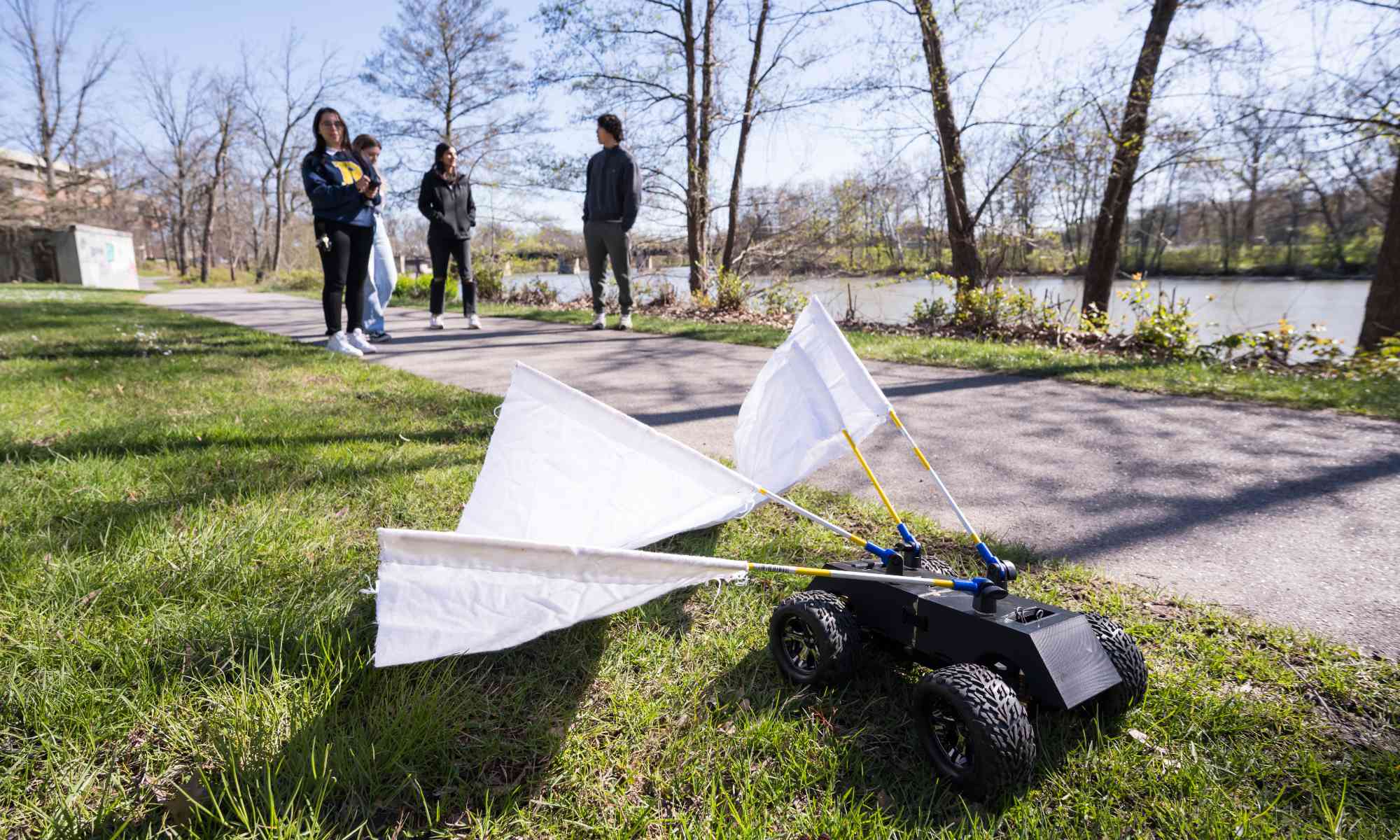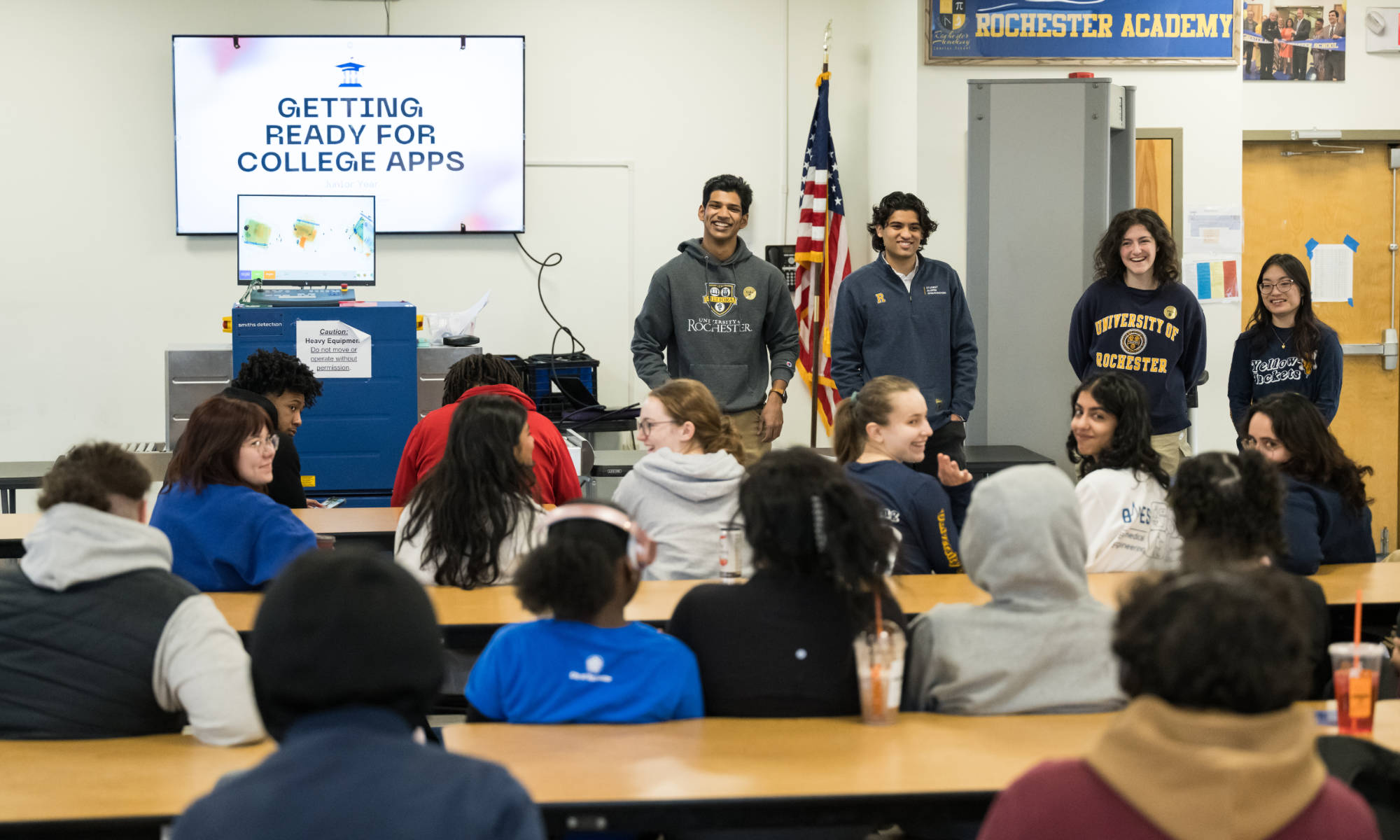Beatriz Gil ’19, Students’ Association president for the College, is a dual major in economics and political science from Barcelona, Spain, and the first international student to hold that role. Henry Carpender ’20, Students’ Association president at the Eastman School of Music, is a trombone performance major from Mundelein, Illinois, outside of Chicago.
Both were elected last spring. As presidents, they set the agenda for student government and are responsible for the implementation of all legislation passed by the Senate.
Gil and Carpender offer their thoughts on why they ran, their goals—and why rock iconoclast Frank Zappa is a huge inspiration for at least one of them.
Why did you choose Rochester?
Gil: Mainly because of the open curriculum. I wanted to double major and double minor (Chinese and international relations), and this was the only university that allowed me to do it.
Carpender: For trombonists who are interested in an historic and vigorous training on their instruments, there’s no better place than where the trombone choir itself was invented by Emory Remington. One of my former instructors, Tim Riordan, studied at Eastman and put Eastman in my sights when I was a high school sophomore.
Why did you decide to run for president?
Gil: Since my first year, I’ve been very involved in SA and felt that being president would be the best way for me to help our community. I really wanted to focus on the international student population, a growing part of our community and which I belong to.
Carpender: Two of my passions are politics and social justice. There was a time when I considered studying prelaw and running for public office in Illinois. These passions, combined with things about Eastman I’d like to see changed in a positive way, influenced my run for office.
What’s a typical day like?
Gil: I go to class in the morning, followed by meetings with different University departments and students. These meetings help me understand what students want, and how that can be applied with the help of various departments. I sometimes only have time to check emails while walking from one meeting to another. I love studying in Q&I at the Rush Rhees Library, because it allows me to study with friends.
Carpender: It goes roughly: wake up, emails, class, emails with breakfast, warm up, class, emails, rehearsal, homework with lunch, another rehearsal, more homework and emails, and then either one more rehearsal or meeting. Then a cool down practice session, dinner, and bed.
What has been your favorite class in college, and why?
Gil: I like all of the classes I’ve taken. For me, the class is made by the professor who teaches it, so a huge shout out to (political science associate professor) Hein Goemans. He believed in me and taught me how to do research as an underclassman, and now I am carrying out my own research.
Carpender: Gosh, that’s tough. If you count lessons with Mark Kellogg, that’s it. It might be a three-way tie between an aural skills class with Bill Marvin, a music theory small group with Ethan Lustig, or a class called “Wagner’s Germany” with Julia Goodwin.
What’s the best part about being SA president?
Gil: Seeing the tangible changes you’re able to make and having students tell you how those changes have made a positive impact in their lives, such as the creation of the International Students’ Affairs Committee.
Carpender: This might sound cheesy, but it’s honestly the students. My ability to interact with the student body brings me so much joy. The Eastman community is so valuable, and being a student leader makes all of the challenges worth it.
What’s the most challenging part?
Gil: Knowing that no matter what you do, some people will be unhappy. However, I think it’s reflective of real life, so I’m very happy with the challenge and try my best to make everyone feel as comfortable as possible with everything we do.
Carpender: The pace of the job. Keeping up with the flood of emails has been a tremendous challenge, and not letting things pass me by is a daily struggle. I’m a bit of a control freak, so I’ve struggled with asking people to do something for me.
What has surprised you most about the job?
Gil: The number of hours put into even the smallest change, and the huge support administrators give us.
Carpender: The amount I’m allowed to do. There are meetings regarding safety and security and academic meetings that, the first time I went I was like, “Oh my gosh, I’m allowed to be here?” It’s been vastly helpful, but it surprised me.
Who inspires you?
Gil: My mother, Maria Victoria, inspires me to be happy and positive no matter what difficulties I’m going through. She reminds me that people not being grateful for what you do should never deter you from being yourself.
Carpender: I have three distinct individuals who have really inspired me. First is Colleen Bayoneto, my private instructor throughout high school. She has single-handedly shaped a large part of who I am. Second is Frank Zappa. It’s a weird one, I know, and I’m aware of and reject many of the problematic parts of his career. But his dedication to his craft and dedication to musical excellence is inspiring and has been surpassed by few in the 20th century. The third is my father. He has been a musician in Chicago for more than 35 years, a creative force who’s adored by colleagues and loved deeply by his family.
What’s the one thing you most want to accomplish before your term ends in the spring?
Gil: We’re working on bringing free printing to campus for students. We’ve been working on it since June, and I hope it’s implemented next semester.
Carpender: I want to make sure that SA plays a part in a strong Black History Month and a strong Women’s History Month, and that SA can sponsor events tied to understanding and rejecting prejudice. My pipe dream is to get more stands for Eastman or hammer out a portable stand rental program. That’s been on my agenda since Day One.
What are your plans after you graduate?
Gil: I’ll be going to San Francisco next year to work in strategy and operations for Deloitte.
Carpender: I’ll likely do my master’s in jazz studies, perhaps here at Eastman. After that, I want to be a freelancer for all kinds of music in Chicago.
What’s your advice to the next SA president?
Gil: To follow your passions and make sure you are available, so that students feel comfortable going to you with concerns.
Carpender: Don’t be afraid to ask for help. This job is so much work that you cannot bear the whole load alone. Most importantly, if you don’t love the Eastman community, you’ll never see the job through. You can’t doubt for one second that Eastman is the most important thing to you at that point in your life.
What’s your dream job?
Gil: Public service. I plan on having a career in diplomacy and going into political consulting.
Carpender: I have a dream path: freelance audition for Dweezil Zappa’s band, be on one or two tours playing Frank Zappa’s music, return to Chicago to freelance, have a small studio of precollege trombonists, and then teach, play, and have a family until the very end. Best. Life. Ever.




